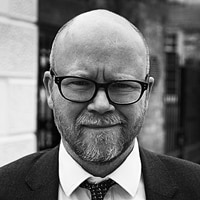 BBC News
BBC NewsBorrowing was £17.4bn last month, the second highest October figure since monthly records began in 1993.

Toby Young
Journalism is a great career for someone in their twenties and thirties, but it’s a very people are given proper employment contracts by newspapers with pension benefits and healthcare. So once you’re in your forties and you’re married and have a family, and mortgage contributions to make it’s a less attractive profession. Some people combine it with doing other things. Others use it as a springboard into marketing and PR.
Something I found unsatisfying about being a journalist is that there’s not much sense of progression. If you’re a reporter or a columnist, you’re doing the same thing day in day out for decades at a time. Unlike an architect where you can look back and say: “I built that” with journalism there’s sometimes a lack of a cumulative sense of achievement. If you’re on the editorial track, and you shin up the greasy pole and become editor-in-chief, that can be a different thing though.
One time I had to interview the film director James Ivory. I overslept and I got woken by the publicist about half an hour after it was meant to have started. The publicist said: “That’s not a good enough excuse to keep him there!” “Well what should I say?” “Car crash!” When I got there he quizzed me in great forensic detail about my car crash. He obviously knew it was a lie. I thought at the end of it he might hire me as a screenwriter so great was my imaginative capacity.
I’ve always had an entrepreneurial streak. I set up my first magazine in primary school, so when I set up The Modern Review when I was 27 in 1991, I was able to say I’d been in the publishing business for 20 years. I eventually got involved in education and set up four schools, and then more recently The Free Speech Union. Setting up schools and institutions gives you a sense of leaving something behind. You have to think much more commercially if you start things, and if there’s a market for it, and if so, how to reach that market.
As British universities have admitted more and more students and grown in size, they’ve attracted left-wing academics with a sense of social mission who want to change the world by evangelising and converting them to the cause of social justice. It’s a generational shift. Most academics were radicalised in the 1960s, or those who weren’t have hand-picked their successors. As these resources have grown, more has been spent on diversity-crats. As tuition fees have gone up, students have become more and more demanding that they be looked after by university administrators.
The Free Speech Union is often contacted by students and academics who have got into trouble for exercising their lawful right to free speech – sometimes quite bad trouble. So a good example is Timothy Luckhurst, who’s the head of South College at Durham, which is the equivalent of an Oxbridge college, for inviting Rod Liddle to speak. He was placed under investigation, and the Free Speech Union had to look after him. Durham is one of the worst offenders, and we’re often contacted from people like Oxford and Cambridge. On the other hand, we don’t get too many inquiries from Birmingham, and only a few from Exeter.
One of the reasons to be cautious about how quickly the spirit of liberty can be restored is it was revealed to be in a very decrepit state during the last two years. It was surprisingly easy for the government and various public health agencies, civil servants and the BBC to persuade people to exchange their liberty for safety, much more so than it had been in the Asian flu in the 1950s. That was true not just of Britain but of most liberal democracies. Today, when we look at the Draconian lockdowns in China, and people streaming from their windows for help, we think that’s what tyranny like, but two years ago people did the same. That was a sobering moment.
Toby Young founded the Free Speech Union